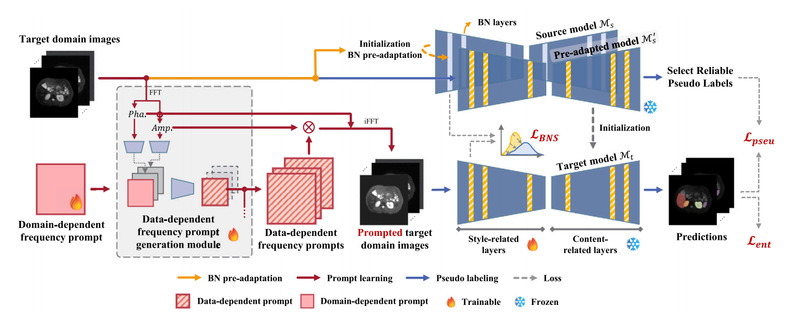

DDFP: Data-dependent frequency prompt for source free domain adaptation of medical image segmentation
Knowledge-Based Systems (IF=7.6)
Abstract
Domain adaptation addresses the challenge of model performance degradation caused by domain gaps. In the typical setup for unsupervised domain adaptation, labeled data from a source domain and unlabeled data from a target domain are used to train a target model. However, access to labeled source domain data, particularly in medical datasets, can be restricted due to privacy policies. As a result, research has increasingly shifted to source-free domain adaptation (SFDA), which requires only a pretrained model from the source domain and unlabeled data from the target domain data for adaptation. Existing SFDA methods often rely on domain-specific image style translation and self-supervision techniques to bridge the domain gap and train the target domain model. However, the quality of domain-specific style-translated images and pseudo-labels produced by these methods still leaves room for improvement. Moreover, training the entire model during adaptation can be inefficient under limited supervision. In this paper, we propose a novel SFDA framework to address these challenges. Specifically, to effectively mitigate the impact of domain gap in the initial training phase, we introduce preadaptation to generate a preadapted model, which serves as an initialization of target model and allows for the generation of high-quality enhanced pseudo-labels without introducing extra parameters. Additionally, we propose a data-dependent frequency prompt to more effectively translate target domain images into a source-like style. To further enhance adaptation, we employ a style-related layer fine-tuning strategy, specifically designed for SFDA, to train the target model using the prompted target domain images and pseudo-labels. Extensive experiments on cross-modality abdominal and cardiac SFDA segmentation tasks demonstrate that our proposed method outperforms existing state-of-the-art methods. Our code is available online.
